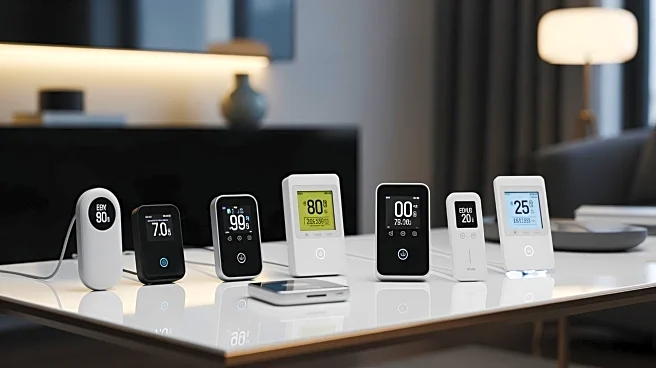What's Happening?
The homecare self-monitoring device market is projected to see substantial growth from 2025 to 2032, according to a report by Coherent Market Insights. The report highlights the expansion of the market driven by key players such as Abbott, GE HealthCare,
and ResMed, among others. These companies are focusing on developing devices for monitoring various health parameters, including blood pressure, glucose levels, and respiratory functions. The market is segmented by device type, application, and region, with North America, Europe, and Asia-Pacific being key areas of focus. The report emphasizes the importance of strategic initiatives and technological advancements in driving market growth.
Why It's Important?
The growth of the homecare self-monitoring device market is significant as it reflects a shift towards personalized healthcare and increased patient autonomy. This trend is likely to impact the healthcare industry by reducing the burden on traditional healthcare facilities and enabling patients to manage their health conditions more effectively at home. The expansion of this market also presents opportunities for innovation and investment in medical technology, potentially leading to improved health outcomes and reduced healthcare costs. Companies involved in this sector stand to benefit from increased demand and the potential for market leadership.
What's Next?
As the market continues to grow, companies are expected to focus on enhancing device capabilities and expanding their product offerings to meet diverse patient needs. Regulatory compliance and technological integration will be crucial for maintaining competitive advantage. Additionally, collaborations and partnerships may emerge as companies seek to leverage expertise and resources to accelerate innovation. The market is likely to see increased competition, prompting companies to adopt strategic marketing and distribution strategies to capture market share.
Beyond the Headlines
The rise of homecare self-monitoring devices may lead to ethical considerations regarding data privacy and security, as these devices often collect sensitive health information. Ensuring robust data protection measures will be essential to maintain consumer trust and comply with regulations. Furthermore, the accessibility and affordability of these devices could play a role in addressing healthcare disparities, providing underserved populations with better access to health monitoring tools.















